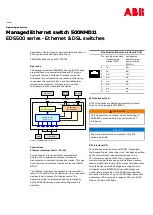
88
datagram are mapped to different priority levels based on DSCP priority mode;
non-IP datagram with IEEE 802.1Q tag are mapped to different priority levels
based on IEEE 802.1P priority mode if IEEE 802.1P Priority is enabled; the
untagged non-IP datagram are mapped based on port priority mode.
Syntax
qos queue dscp-map
{
dscp-list
} {
tc-id
}
no qos queue dscp-map
Parameter
dscp-list
——
List of DSCP value. One or several DSCP values can be typed
using comma to separate. Use a hyphen to designate a range of values, for
instance, 1,4-7,11 indicates choosing 1,4,5,6,7,11. The DSCP value ranges
from 0 to 63.
tc-id
——
The priority level the packets with tag are mapped to, which ranges
from tc 0 to tc 3.
Command Mode
Global Configuration Mode
User Guidelines
By default, the mapping relation between tag and the egress queue is:
(0-15)-TC 0, (16-31)-TC 1, (32-47)-TC 2, (48-63)-TC 3.
Example
Map DSCP values 10-12 to TC 2:
TL-SL2428(config)# qos queue dscp-map
10-12 2
qos queue mode
Description
The
qos queue mode
command is used to configure the Schedule Mode. To
return to the default configuration, please use
no qos queue mode
command.
When the network is congested, the problem that many packets compete for
resources must be solved, usually in the way of queue scheduling. The switch
will control the forwarding sequence of the packets according to the priority
queues and scheduling algorithms you set. On this switch, the priority levels are
labeled as TC0, TC1… TC3.
Syntax
qos queue mode
{ sp | wrr | sp+wrr | equ }
no qos queue mode
















































